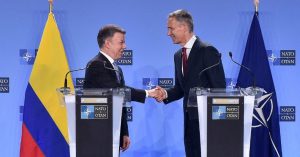
Image courtesy of @JuanManSantos: Twitter.
Colombia has joined the 29 member countries of NATO as the first Latin American country to officially be a part of the intergovernmental military alliance.
Although joining as a “global partner” means Colombia will not have to take part in military action, the country will be fully accredited in Brussels. Its status as a partner was officially announced in May 2017. However, the partnership was formalised after Santos’ recent visit to NATO headquarters at the end of last month .
In a televised address he gave along with NATO Secretary General Jens Stoltenberg in Belgium, President Santos detailed his country’s main objectives for becoming part of the alliance. Importantly, he intends to focus on helping former FARC members in the post-conflict transition phase as part of the peace accord, offering them access to NATO’s standardised processes and training portfolio.
Colombia’s association with NATO, Santos hopes, will allow an exchange of experiences and skills in a range of areas, from naval operations to climate change initiatives and disaster attention.
He intends for the new collaboration to offer more transparency in military purchases, improved practices to fight against corruption – which is NATO’s priority – better tools to ensure cybersecurity and the tackling of organised crime and drug trafficking.
Colombia’s President also emphasised his desire to introduce more women into the Colombian Armed Forces and explained the benefits NATO will bring to military training, claiming that the Armed Forces are the ones who most deserve to benefit from the new partnership.
“Colombia benefits a lot from being an active part of the international community, many of the problems we face are increasingly global and need the support and collaboration of other countries for their solution,” Santos commented.
For his part, Stoltenberg credited Santos’ efforts to bring peace to Colombia as President, stating that “our cooperation has provided real benefits – both to Colombia and to NATO.”
The news comes at a time that the alliance’s unity has been tested on a number of issues, including the contributions made by each member state and the Iran nuclear deal.
Venezuelan officials have continued to register their displeasure about Colombia’s new role as a global partner to NATO, considering the possible military threat it may pose.
A recent televised announcement from current Venezuelan President Nicolás Maduro rejected Santos’ decision to join NATO, questioning why Colombia would want to introduce an external military alliance into the region, not to mention one of nuclear capabilities, which would threaten the peace and stability of Latin America, he claimed.
Colombia is also part of the MAM, a non-aligned movement and nuclear threat initiative formed during the cold war, which states that its members may not be part of any military organisation like the North Atlantic Treaty.
It is important, however, to bear in mind that being a “global partner” of NATO is not necessarily the same as being a member as, although members of the Colombian Armed Forces are able to access UN missions, they do not necessarily have to be military or conflict-oriented. Currently, the other global partners are Afghanistan, Australia, Iraq, Japan, South Korea, Mongolia, New Zealand and Pakistan.
What’s certain, though, is that even though his Presidency is nearing its end, Santos continues to ensure that his achievements come in thick and fast, with last month’s entry into the OECD announced just before the first round of electoral voting, and recent developments meaning that Colombians will not need a visa to enter Europe.
La paz es la puerta del cambio que vive Colombia. Coincido con @FedericaMog en que avanzar es entrar a la @OECD, ser socio global de @NATO, tener un TLC con la Unión Europea y que ya no nos pidan visa para entrar a Europa. Nada de esto pasaba hace 8 años. pic.twitter.com/tvku8zWCaY
— Juan Manuel Santos (@JuanManSantos) 31 May 2018





